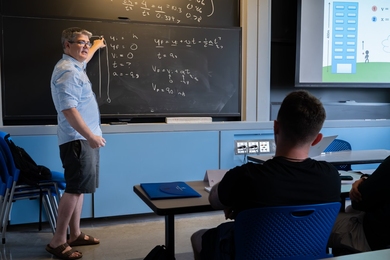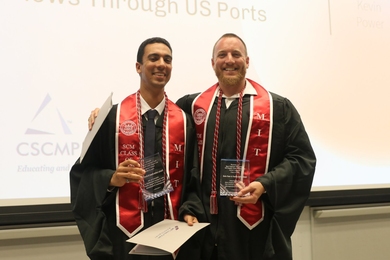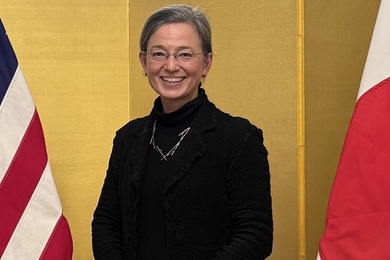"Housing wanted for MIT employee whose house just burned down. Couple with seven-month-old baby seeks short-term, affordable housing for rest of semester," said the ad in last week's MIT Tech Talk.
Behind those two sentences lies the story of Shona Chattarji's sudden loss of earthly possessions to a three-alarm fire that destroyed a triple-decker in Medford on the morning of February 15. Dr. Chattarji, a postdoctoral associate in brain and cognitive sciences, his wife, Ruma, and their seven-month-old son lived in the second floor apartment of that building.
They escaped the fire without physical harm, but they're still coping with the emotional strain of losing their home. Dr. Chattarji said he hasn't received any response from the ad, but they do have temporary housing, provided by a man they'd never met.
Art Heron of Belmont heard about the Chattarji's troubles through a friend of a friend and offered the family temporary lodging in the first floor of his three-family home. The extraordinary generosity of Mr. Heron was no doubt prompted by the memory of a similar loss -- of both home and business -- that he and his wife suffered some time ago, according to Dr. Chattarji.
"When we arrived that first evening, he had put in a bed for us and a TV and microwave oven. He even left a little teddy bear for the baby. If I remember anything from this in 10 years, I'll remember his kindness and the friends who came through for us," said Dr. Chattarji. "It's wonderful to at least know where I'm going when I leave work each day."
The Indian couple, who have no family to turn to in the Boston area, came to the US for school about 12 years ago and stayed for postgraduate work. They've been at MIT for about a year and a half, but plan to return to India this summer when Dr. Chattarji takes up an academic position at a new research institution in Bangalore. They had already packed many of their belongings in preparation for shipment to India.
"My wife had pretty much planned what we'd need to set up household. Many things are not easily available in India, so she had carefully thought through what my son would need until the age of six, like interactive toys, books and clothes," said Dr. Chattarji.
Mrs. Chattarji, who works at the Children's Museum in Boston, had also collected many items in anticipation of establishing a learning center for children in Bangalore. "They were all packed away and stored in the back," said Dr. Chattarji. The back of the house was completely destroyed.
The hungry cries of her son Agnibho, whose name in Sanskrit means "bright like fire," awakened Mrs. Chattarji at about 6:30am that Sunday morning. She heard the smoke alarm sounding and woke her husband, who called the fire department and woke the elderly neighbors on the first floor. The third-floor residents were out of town.
Dr. and Mrs. Chattarji grabbed their coats and shoes and bundled the baby in blankets as they ran from the house into the bitterly cold morning. Dr. Chattarji said he pounded on a neighbor's front door to wake her, not so much to warn her as to find a warm place for Agnibho.
That was the beginning of several long and exhausting days traveling from place to place in search of a house to call home. They spent the first night at a friend's house, and the next two nights in a hotel, using a voucher provided by the Red Cross for one night. They were extremely grateful a few days later to learn of Mr. Heron's generous offer.
Dr. Chattarji said that Mr. Heron has offered to let them move into the basement apartment, where they can remain rent-free until they leave for India, but it must first be cleaned out and painted.
In the meantime, Dr. Chattarji, who did not have renters' insurance, spends most of his days bouncing back and forth from agency to agency tying up loose ends. He said he still hasn't given up hope of salvaging some of their belongings.
In particular he wants to look for a family heirloom given to his wife by his grandmother, and a few other irreplaceable items. "They did let me into the house once for a short time. I was crawling on the floor looking for little things, like the ultrasound picture of my baby or my passport," he said.
The family's immediate needs are housing, or help preparing the basement of their present lodgings; furniture, such as a futon couch; baby furniture; household and kitchen items; and clothing and shoes for all three of them. He said he could also use some legal advice to find out a tenant's rights in cases like this one.
Anyone wishing to help Dr. Chattarji's family can contact Judith Rauchwarger in the Department of Brain and Cognitive Sciences at x3-5749 or judithr@wccf.mit.edu. She can provide additional information on clothing sizes and specific items needed by the family.
A version of this article appeared in MIT Tech Talk on March 4, 1998.





